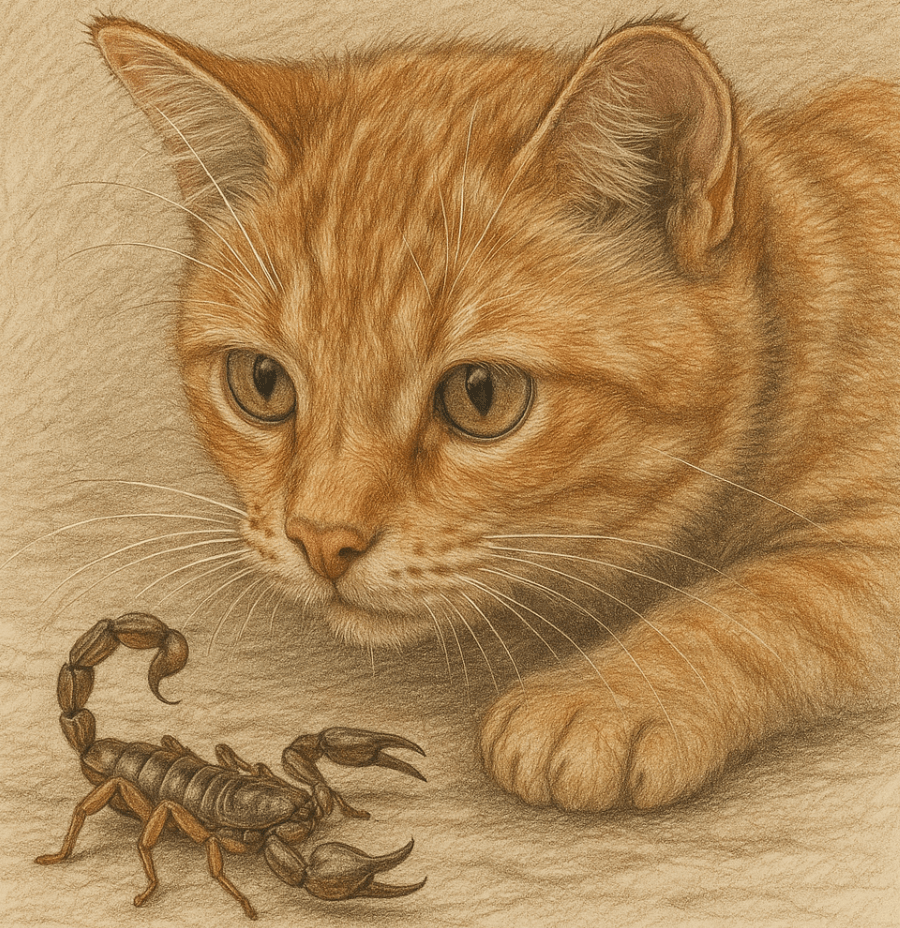Can Cats Eat Scorpions?
Cats are curious creatures by nature, and their hunting instincts often lead them to chase and pounce on anything that moves—including scorpions. But is it safe for cats to eat scorpions? While cats are natural predators with a knack for catching small prey, not everything they hunt is safe for consumption. Scorpions, with their venomous stingers and hard exoskeletons, pose potential risks that every cat owner should be aware of. In this blog post, we’ll explore whether cats can safely eat scorpions, the dangers involved, and what you should do if your feline friend encounters one. By understanding these factors, you can ensure your cat stays healthy and out of harm’s way.
Potential Risks of Cats Eating Scorpions
While some cats may successfully catch and eat scorpions without incident, there are several risks associated with this behavior. Understanding these dangers can help you prevent potential health issues.
Venomous Stings:
Some scorpion species have venom potent enough to cause pain, swelling, or even systemic reactions in cats. A sting during the hunt could lead to serious complications.Choking Hazard:
The hard exoskeleton of a scorpion can pose a choking risk, especially if your cat swallows it whole without proper chewing.Digestive Issues:
The tough outer shell of a scorpion may cause gastrointestinal blockages or irritation, leading to vomiting or diarrhea.Bacterial Infections:
Scorpions may carry harmful bacteria or parasites that could infect your cat if ingested.Allergic Reactions:
Some cats may have allergic reactions to scorpion venom or proteins, resulting in symptoms like difficulty breathing or swelling.
These risks highlight why it’s important to monitor your cat’s interactions with scorpions and take precautions to keep them safe.
Signs Your Cat May Have Eaten a Scorpion
If your cat has eaten a scorpion, they may exhibit certain signs that indicate discomfort or illness. Being able to recognize these symptoms allows you to act quickly and seek veterinary care if needed.
Excessive Drooling:
Drooling can occur if your cat has been stung in the mouth or is experiencing nausea from ingesting the scorpion.Vomiting or Diarrhea:
Gastrointestinal upset is a common reaction to eating something unusual or harmful, such as a scorpion.Lethargy or Weakness:
If your cat seems unusually tired or unresponsive, it could be a sign of poisoning or an allergic reaction.Swelling or Redness:
Swelling around the face, paws, or mouth may indicate a sting or allergic response to the scorpion.Pawing at the Mouth:
This behavior often suggests irritation or pain, possibly from a sting or the hard exoskeleton.
If you notice any of these signs, contact your veterinarian immediately to ensure your cat receives appropriate care.
Check this guide 👉Can Cats Eat Liverwurst? Best 7 Expert Tips!
Check this guide 👉Can Cats Eat Slugs? Best 7 Expert Tips!
Check this guide 👉Can Cats Eat Brisket? Best 7 Expert Tips!

Safe Practices Around Scorpions | Risks of Cats Eating Scorpions |
|---|---|
Keep your home free of scorpion infestations | Venomous stings causing pain or illness |
Supervise outdoor playtime in scorpion-prone areas | Choking hazards from hard exoskeletons |
Provide alternative toys for hunting instincts | Digestive blockages or irritation |
Educate yourself about local scorpion species | Bacterial infections from scorpion bodies |
Consult your vet if exposure occurs | Allergic reactions to venom or proteins |
How to Prevent Your Cat from Eating Scorpions
Prevention is key to ensuring your cat doesn’t encounter or ingest scorpions. These tips will help you minimize the risks and keep your feline friend safe.
Inspect Your Home Regularly:
Check for cracks, crevices, and other entry points where scorpions might hide, and seal them off promptly.Use Natural Repellents:
Cedar oil, diatomaceous earth, or essential oils like lavender can deter scorpions without harming your pets.Keep Outdoor Areas Clean:
Remove debris, woodpiles, and standing water from your yard to eliminate scorpion habitats.Supervise Outdoor Adventures:
If your cat enjoys exploring outdoors, accompany them to ensure they don’t come into contact with scorpions.Provide Safe Hunting Alternatives:
Offer interactive toys or puzzle feeders to satisfy your cat’s hunting instincts without the need to chase live prey.
By taking these precautions, you can reduce the likelihood of your cat encountering or eating a scorpion.
What to Do If Your Cat Eats a Scorpion
If your cat eats a scorpion, it’s important to stay calm and assess the situation carefully. Here’s what you should do to ensure their safety.
Observe for Symptoms:
Watch for signs of distress, such as drooling, vomiting, or swelling, which may indicate a problem.Contact Your Veterinarian:
Even if your cat seems fine, it’s a good idea to consult your vet for advice specific to your situation.Avoid Inducing Vomiting Without Guidance:
Never attempt to make your cat vomit unless instructed by a professional, as this could worsen the situation.Monitor Closely for 24 Hours:
Keep a close eye on your cat’s behavior and appetite to detect any delayed reactions.Keep Records of Local Scorpion Species:
Knowing which types of scorpions are common in your area can help your vet determine the level of risk.
Taking these steps ensures your cat receives timely care and minimizes potential complications.
Common Misconceptions About Cats and Scorpions
There are several misconceptions about cats and scorpions that can lead to misunderstandings. Clarifying these myths helps set realistic expectations for pet owners.
Cats Are Immune to Scorpion Venom:
While cats are more resistant than humans, they are not immune and can still suffer from stings or venom effects.Scorpions Won’t Enter My Home:
Scorpions can easily sneak into homes, especially in warm climates, making regular inspections crucial.All Scorpions Are Deadly:
Most scorpion species are harmless, but some, like bark scorpions, can pose significant risks to pets.Cats Always Avoid Dangerous Prey:
Cats’ curiosity often overrides caution, leading them to engage with potentially harmful creatures.Indoor Cats Are Completely Safe:
Indoor cats can still encounter scorpions if they enter the home, so prevention is necessary regardless of lifestyle.
Understanding these truths ensures better protection for your cat.
Alternative Ways to Satisfy Your Cat’s Hunting Instincts
If your cat is fascinated by scorpions or other small creatures, redirecting their energy toward safer alternatives can fulfill their natural instincts.
Interactive Toys:
Feather wands, laser pointers, and toy mice mimic the thrill of the hunt without the risks.Puzzle Feeders:
These toys challenge your cat mentally while rewarding them with treats or kibble.Catnip-Filled Toys:
Toys infused with catnip stimulate interest and provide hours of entertainment.Window Perches for Bird Watching:
Observing birds or insects from a safe distance satisfies their curiosity without direct interaction.Supervised Outdoor Exploration:
Leash training or enclosed outdoor spaces allow your cat to explore safely under your watchful eye.
These alternatives keep your cat engaged while steering clear of dangerous prey.
How to Create a Scorpion-Free Environment for Your Cat
Creating a safe environment is essential to protecting your cat from scorpions. These practical steps will help you minimize the risk of encounters.
Seal Cracks and Gaps:
Use caulk or weatherstripping to block entry points around doors, windows, and foundations.Install Door Sweeps:
Door sweeps prevent scorpions from crawling underneath exterior doors.Reduce Outdoor Lighting:
Bright lights attract insects, which in turn attract scorpions; use motion-activated lighting instead.Trim Vegetation Near the House:
Overgrown plants or shrubs can serve as bridges for scorpions to enter your home.Use Pet-Safe Pest Control:
Opt for non-toxic pest control methods to eliminate scorpions without endangering your cat.
A proactive approach ensures a safer living space for both you and your feline companion.
Frequently Asked Questions About Cats and Scorpions
Are all scorpions dangerous to cats?
No, but some species have venom that can harm cats. It’s best to avoid exposure altogether.
Can indoor cats encounter scorpions?
Yes, scorpions can enter homes through cracks or gaps, so regular inspections are important.
What should I do if my cat is stung by a scorpion?
Seek veterinary attention immediately, as stings can cause pain, swelling, or more severe reactions.
Do cats instinctively know to avoid scorpions?
While some cats may avoid scorpions, others may not recognize the danger and attempt to attack or eat them.
Are scorpions attracted to pet food?
Yes, scorpions are drawn to food sources, so store pet food in sealed containers to reduce attraction.
Keeping Your Cat Safe from Scorpions
Cats are natural hunters, but their curiosity can sometimes lead them into risky situations, such as eating scorpions. While not all scorpion encounters result in harm, the potential dangers make it essential to take preventive measures and remain vigilant. By keeping your home scorpion-free, supervising your cat’s activities, and knowing how to respond in case of exposure, you can ensure your feline companion stays happy and healthy. Remember, your cat relies on you to protect them from hidden threats—so stay informed and proactive to keep them safe.
Can a Cat Be Tested for Rabies? Best 7 Expert Tips! – Learn if testing is possible, understand the process, and discover prevention tips to keep your cat safe from rabies.
Can a Dog Be Tested for Rabies? Best 7 Expert Tips! – Learn how rabies testing works, why it’s critical, and what every dog owner needs to know.
Best Vegetables for Cat Food: Best 7 Expert Tips! – Discover safe, nutritious veggies to boost your cat’s diet, support digestion, and enhance overall health naturally.
Best Vegetables for Dog Food: Best 7 Expert Tips! – Discover safe, nutritious veggies to boost your dog’s diet, support digestion, and enhance overall health naturally.




